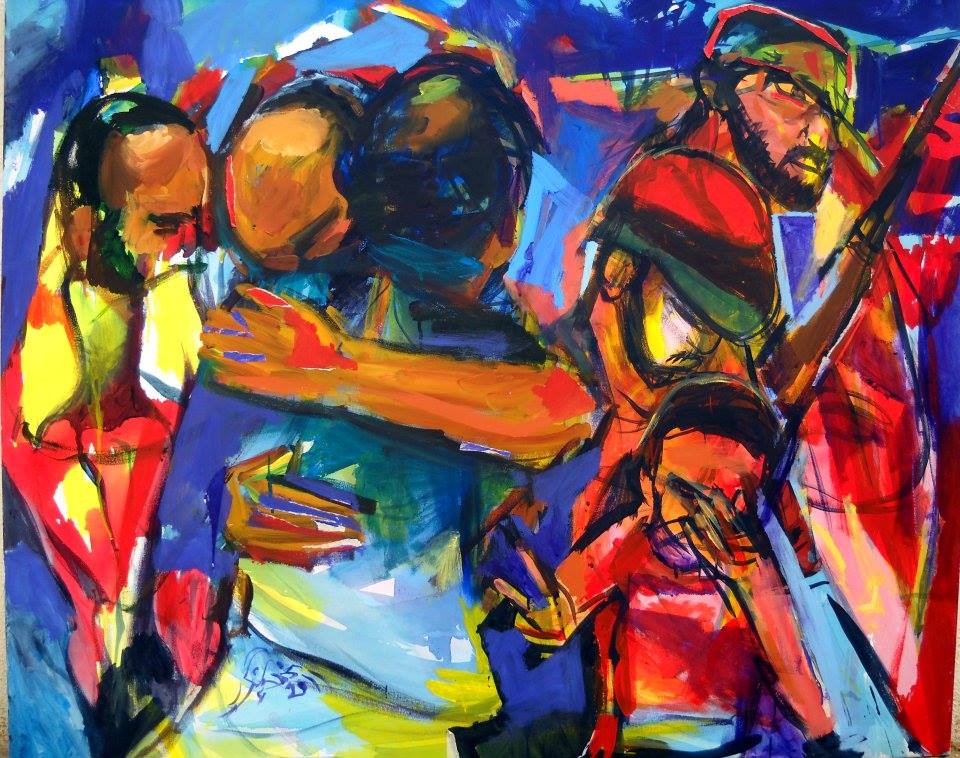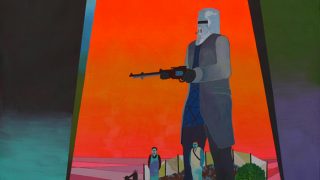Pity the nation that welcomes its new ruler with trumpeting,
and farewells him with hooting,
only to welcome another with trumpeting again…
Pity the nation divided into fragments,
each fragment deeming itself a nation
- Khalil Gibran
Recently, Abdulmajid Ahmed Ali, a British trained consultant surgeon and one of the unsung heroes of the Libyan revolution, sent me a message expressing great distress at the state of affairs back home in Libya. The hurt in the message was palpable. Coming from Majeed the message pained me greatly.
Majeed is one of many who took part in the revolution motivated exclusively by love of country and fellow Libyans. These are men and women who joined the battle against tremendous odds, with no regard for their own safety or pursuit of personal gains. This initial overwhelming “revolutionary idealism” compounds the bitterness of the disappointment at what has transpired in Libya since.
From Heroes to Hijackers
In contrast to the altruism of the young men and women of the early days of the uprising, the political opportunism of the mini-Gadhafis who have emerged since, jostling and scrambling for whatever spoils and windfalls they can get their hands on, is utterly shameful. The rampant economic corruption that unfolded after the conclusion of armed conflict is something that could put any veteran Gaddafi era kleptomaniac to shame. These opportunists have succeeded in warping the revolution in many Libyans’ minds, particularly the young.
Gaddafism, without Gaddafi
The Libyan uprising took place in a context that lacked pre-existing civic and political institutions. The National Transitional Council (NTC) and its successor, the General National Congress (GNC), paid scant attention to the need to develop and coalesce such institutions. The absence of administrative continuity provided by a functioning bureaucracy was a major obstacle to the same smooth transition witnessed by other societies, such as those of Eastern Europe after the fall of communism, or even Tunisia after the fall of Ben Ali. This was perhaps one of the most serious setbacks Libya experienced in the early aftermath of the fall of Gadhafi.
During the Gadhafi era, Libya had an elaborate and complex bureaucratic structure with new organizations being superimposed upon existing institutions. The result was parallel and overlapping structures, with unclear lines of authority and responsibility that often caused intense competition and rivalry within the government, allowing Gadhafi to be the sole arbiter of minute details at national and sub-national level. The post-uprising period has simply replaced one of the layers, that is, the “Revolutionary Committees” with another, the “Althuwar/revolutionaries”. More ominously, the men with the guns have replaced Gadhafi as the new arbiters.
Even more disastrous for Libya has been the passing at gunpoint of the exclusion law. This prohibits from office anyone who served in a senior post during the forty-two year rule of Gadhafi, thus depriving the country of anyone with even the most basic decision-making skills.
The concept of “Althuwar/ revolutionaries” acquiring experience in how to manage affairs of state by on the job training in senior positions, including cabinet posts, has led to the bizarre situation of a whole country being run by novices and interns. Meanwhile, unaccountable warlord puppeteers continue to pull the strings and direct their proxies in government in much the same way Gadhafi did, resulting in the perpetuation of the worst features of Gaddafism, without Gaddafi.
The Identity Crisis
With the post-February 17 dismantling of the all-encompassing central authority, Libya reverted to its constituent parts of pre independence with primary, and at times sole, identity centred around regions and tribes, and with the same tussle for dominance among the different tribes and regions that marked the late forties of the last century. That tussle ended with the regional/tribal compromise of the 1951 constitution, a document that perhaps needs revisiting, not least for the regional/tribal compromises it offers.
Libyan society is still at a transitional stage, where tribal identity is stronger than nation-based identity – yet the traditional tribal order and intra/inter-tribal conflict resolution mechanism based on the council of chiefs/elders is long gone. So Libyans have a strong tribal culture, without the tribal structure hierarchy.
Most ominously, the wise old men and the tribal chiefs or elders of past generations who had stature and standing among their peers are no longer there. The presence of the tribal culture without the traditional structure is the main reason that every effort to initiate a process of national reconciliation based on the traditional inter-tribal conflict resolution mechanism has failed. In contrast to 1951, there are no men of stature at the national or tribal level who can sit around the negotiating table to forge a compromise that they can persuade their followers to accept.
Anyone with the slightest knowledge of Libyan history recognized immediately the potential for this descent into chaos. The fact that national reconciliation was not made an urgent priority meant the inevitable unfolding of the situation that now exists. Members of the NTC and its successor, the GNC, bear responsibility, with arguably a degree of either criminal negligence or criminal intent on their part.
The Contrived Security Vacuum
Ever since the beginning of the February 2011 uprising, there has been a series of events, some due to gross incompetence, others to sinister planning, which have combined to create the present situation.
Local warlords and others at the behest of their patrons in the Gulf rejected outright the idea of a non-ideological national army and insisted on militias joining the army as groups, basically in order to take it over. When this was refused, the warlords employed every method imaginable to thwart the building of a national army, including targeted assassinations of army officers who fought on the side of the uprising and had the military skill and the consensus-building ability to help in the national army formation. This started with the abduction and murder of General Abdulfatah Youness. Other army officers who helped with the peaceful handover of Tripoli, such as General Albarani Eshkal and his colleagues, were forced into exile to escape General Youness’ fate. The assassinations have increased in tempo recently, with leadership skill of any type being the main criterion for inclusion on the target list. The tactics of clearing the scene of potential alternative leadership are identical to those employed by Gadhafi.
There is recent talk of establishing a militia-controlled “National Guard“, a military force parallel to the army. Maybe this was the price extracted from the Minister of Defence to stop the assassinations. If established, the National Guard will most likely be modelled on the Saudi National Guard and no doubt will be similarly vetted for ideological purity.
The overall result of the lack of a national reconciliation and establishment of a strong national security force is a fragmented Libya consisting of a number of zones where daily life is relatively safe, while the south of the country in particular is a no man’s land. Such is the lawlessness in the south of Libya, that all kinds of banditry from human smuggling to drug trafficking and arms dealing are conducted in the open without any fear of reprisal. In the rest of the country, the division of territory between different militias prevails.
Militias from Misurata and their allies from Tajoura and Souq Jumaa control the eastern part of Tripoli, while militias from Zintan control the western part of the city. The dividing line between the two groups starts from Tripoli International Airport down to Bab al-Andalus. A tacit division of fiefdoms is in place based on the principle of “Mutually Assured Destruction”. The “MAD” co-existence insures that no one militia encroaches on the other’s territory...
Very few of these tribal militias that now control Tripoli were involved in the fight against Gadhafi in their hometowns or regions, as most of those who did the fighting have returned to their jobs or places of study. The vast majority of the present tribal militias were recruited from among their tribal members to help occupy and control the capitol. Tripoli itself with its 1.6 million inhabitants was not "liberated". It was handed over as a result of a covert understanding between the senior security and military officials and the NTC. This understanding happened around April/May 2011 and was intended to spare the capitol any fighting. It was implemented to the letter and insured that no army or security member lifted his gun to defend the regime once operation "mermaid" was put into action.
The inhabitants of Tripoli see the tribal militias as an occupation force and have a particular loathing for them, not much different from the loathing they had for Gadhafi's revolutionary committees who exercised a similar role. In the latest atrocity, tens of civilians were killed when members of the Misrata militias opened fire on protesters who were demanding that they leave the city.
It’s futile to look to the government for statesmanship or leadership in the situation that continues to unfold. When the Prime Minister refused to succumb to opposition pressure to resign, he was kidnapped from his hotel bed at dawn at gunpoint, and driven away for a chat on the merits of voluntary resignation.
Judging by precedent, the omens for Libya are not good. A country where private militias are carving out turf, armed groups are seizing control of public buildings and assets, and there are daily gun battles between rival factions - all made worse by a powerless central government that has no authority beyond the outskirts of Tripoli, and little within. A country run by competing warlords; with a Balkanized economy, greased on corruption, bribery, and regional self-interest. A country traumatised by a low level civil war that has gone on for years, with no sign of ending. This is Libya in 2013. It was also Afghanistan in the mid-1990's before the Taliban rose to impose some form of authority and control.
Meanwhile, the outside world seems content in awaiting the outcome of the power play in Libya. Much of the initial enthusiasm and goodwill for the Libyan democracy project has evaporated. Neither the EU nor the US wants to get sucked up in Libyan domestic chagrins. Even so, individual Libyans with ambitions for high office are still trying to enthral American and European involvement. Many are still touring major world capitals in search of patrons – some desperately turning to power brokers in the Gulf States.
Among Libyans, the anguished words of the idealist revolutionary, Majeed, speak for most: “I am very confused and disturbed to say the least. My heart is full of sadness and anger... major disappointment. I have started questioning myself. I have fought for a country where the law is above all; now we are left with a country where all are above the law. The innocent people are still suffering but now at a higher and calculated level. Nobody is safe, including us.”
In a chance encounter at an international airport, I asked a couple of members of the Libyan General National Congress about their reaction to the abduction of the Libyan Prime Minister by armed men from his hotel bed at dawn. Their nonchalant response indicated that the matter was of no great significance. Only then did it dawn on me that I have previously failed to see the abduction of the Prime Minister in its proper context, which is that of a whole country being hijacked.
Walking to my gate, I wondered what standing these gentlemen expect their diplomatic passports will enjoy among their hosts, when everyone recognises that Libya is rapidly becoming a mere geopolitical construct of the past.
Translated by Al-Monitor



